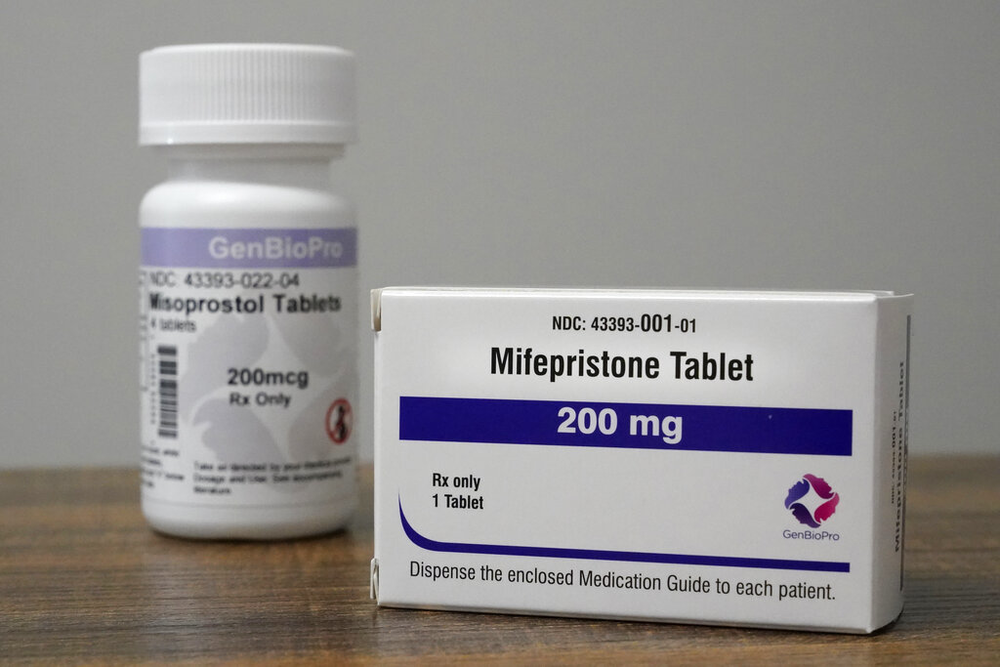
Caption
Containers of the medication used to end an early pregnancy sit on a table inside a Planned Parenthood clinic Friday, Oct. 29, 2021, in Fairview Heights, Ill.
Credit: AP Photo/Jeff Roberson
GPB's Riley Bunch reports from the Capitol

Containers of the medication used to end an early pregnancy sit on a table inside a Planned Parenthood clinic Friday, Oct. 29, 2021, in Fairview Heights, Ill.
A bill filed in the state Senate would require an in-person visit with a doctor before a woman can access abortion pills — counteracting a federal ruling that makes them available through mail.
It also requires women to undergo exams, including ultrasounds, before signing a consent form at least 24 hours before a doctor can provide the abortion pills.
The legislation takes aim at a decision from the Biden administration to allow patients to be prescribed and sent medication that induces abortion without visiting a doctor in person.
Patients are able to access pills through telemedicine, after the reliance on virtual medical visits grew exponentially during the pandemic.
Sen. Bruce Thompson (R-White), who has also launched a bid for state labor commissioner, is the main sponsor of the bill.
“We're certainly not trying to restrict abortion,” he told GPB News. “We're trying to make sure that women have the proper care as they make this difficult decision.”
Supporters of the bill argue that it’s too risky for doctors to prescribe the pills without seeing the woman in person first. The legislation would also make prescribing abortion drugs without following state law a crime.
“With the FDA changing and allowing abortion pills to be sent directly to homes and to women without there being a medical provider involved, it puts a greater risk to the women,” Thompson said.
Twenty-four state senators, all Republicans, have signed onto Senate Bill 351, introduced in the chamber on Monday. All but one of the sponsors are men.
The debate over abortion access took center stage during the 2019 legislative session when lawmakers passed the controversial “fetal heartbeat” bill that restricts abortions once fetal cardiac activity can be detected — usually around six weeks and often before a woman knows they’re pregnant.
The strict law has yet to go into effect as reproductive rights groups fight it in court.
The tumultuous nature of an election year promises a slew of ultraconservative proposals introduced under the Gold Dome this session to curry favor with far-right voters.
Among contentious social issues such as loosening gun laws, revisiting election changes and battling over “critical race theory” in schools, Georgians can expect the abortion debate to be reignited at the Capitol.
Thompson said he has broad support in both the Senate and across the hall. He pushed back against the idea that the legislation is a tool to bolster his statewide bid.
“I'm very optimistic; both chambers have shown favor,” he said. “This is not a bill that, again, I'm doing as I run statewide.”
But at least one of the General Assembly’s leaders has already said he doesn’t have an appetite to revisit the strict law passed three years ago until the U.S. Supreme Court rules on a similar Mississippi law that challenges Roe v. Wade.
“I've been around here for a couple of debates on abortion — one we did back in ‘13 or ‘14 with the fetal pain bill and then more recently in 2019 with the heartbeat bill — there's no topic that we talk about that’s more emotionally charged than that,” House Speaker David Ralston said at the beginning of session.
He said additional changes to the bill passed in 2019 is not on his legislative agenda.
Thompson’s bill targets federal changes made to abortion access as COVID-19 has limited access to in-person medical providers.
Biden’s changes to Food and Drug Administration rules were originally set to last only through the public health emergency, but the FDA announced in December that it would permanently lift the ban on mailing abortion pills.
The change sparked a national effort by conservative groups and lawmakers in multiple states to block access through virtual medical visits — Georgia among them.
The bill also expands abortion reporting requirements. Physicians who don’t fully comply can be at risk of losing their license and are subject to lawsuits.
Staci Fox, president of Planned Parenthood Southeast, said that she’s not surprised Republican legislators are drawing a focus to abortion in another session. She pointed to the efforts behind Georgia’s six-week abortion ban that’s still held up in court.
“Don't act like you really care about the safety of women in this state,” she said. “We know the FDA has already ruled mifepristone to be an overwhelmingly safe option for abortion. And these politicians have to be held accountable for wasting taxpayer dollars on something like this.”
Saturday marked the 49th anniversary of the Supreme Court’s historic decision on Roe v. Wade legalizing abortion around the nation.
Democratic legislators along with a coalition of reproductive rights advocates held a press conference Tuesday in support of a resolution to uphold universal access to abortions for women.
“We have over a dozen legislators who are signing on to this proactive measure because we need to continue to reframe this issue,” said Atlanta Democrat Rep. Park Cannon. “Access to abortion in Georgia is supported by 70% of voters, and the elected officials are playing games with health care during a pandemic."